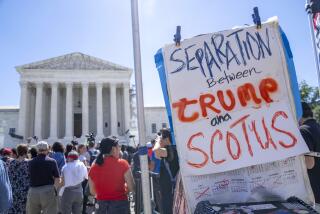Trump’s ‘due process’ dodge on impeachment

- Share via
It’s a “lynching,” President Trump raged in a predawn tweet on Tuesday: “They can impeach the President without due process or fairness or any legal rights.” This president has never seemed like a stickler for “due process,” but maybe a liberal is a conservative facing impeachment, to paraphrase Tom Wolfe.
Improbably enough, “due process” has become a Trumpist battle cry, and the administration’s excuse for stonewalling the House impeachment inquiry. Trump is free to ignore congressional subpoenas, the White House counsel Pat Cipollone insists, because the House has denied him “basic constitutional rights.”
Due process is an important principle, but in this case, it’s a phony excuse for Trump’s refusal to cooperate with the inquiry. The House inquiry doesn’t deny the president a single right the Constitution grants him.
In a strident letter to the House leadership, Cipollone argues that President Trump, as the target of the impeachment inquiry, should be entitled to be represented by counsel, cross-examine witnesses and present his own evidence.
The president will get these protections should the impeachment process result in an actual Senate trial. But the House’s role in the current phase is like that of a grand jury: It is assessing whether there’s adequate reason to have a trial in the first place.
In the criminal context, grand jury targets get none of the protections the Trump team demands. They have no right to present their side of the case, or even appear before the tribunal. That’s despite the fact that a criminal indictment can result in loss of liberty or even life. By contrast, in the impeachment context, we’re talking about putting someone out of a job.
It’s not obvious that the 5th Amendment’s Due Process Clause — “No person shall ... be deprived of life, liberty, or property, without due process of law” — applies also to impeachment. Trump’s life and liberty would not be at risk; his argument would have to rest on his alleged property interest in the job. The Supreme Court has required “some kind of a hearing” for terminations of certain public employees, but it seems odd to suggest that Donald Trump has a property right to an office he holds in trust for the American people.
At any rate, Michael Gerhardt, an expert on impeachment, has noted, that if the Due Process Clause applies, “it is not clear that it requires anything more than what the House and the Senate have traditionally done in this area.”
Congressional practice has never been as rigid and rule-bound as Trump and Cipollone might like. In 19th-century impeachments, including in President Andrew Johnson’s, it was typical for the House to vote to impeach officials for “high crimes and misdemeanors” before formally adopting articles of impeachment that laid out the precise charges. There’s never been an agreed-on burden of proof for any part of the presidential impeachment process, including in the Senate impeachment trial.
The Constitution simply does not give impeachment targets the rights of defendants in criminal trials. As Alexander Hamilton noted in the Federalist, impeachment proceedings, by their nature, “can never be tied down by such strict rules … as in common cases serve to limit the discretion of courts in favor of personal security.”
Still, the White House Counsel has half a point when he argues that the full House should formally vote to authorize an impeachment inquiry. Nothing in the Constitution requires this move, but this was done at the start of impeachment proceedings for Presidents Nixon and Clinton. The House leadership has no good reason not to honor past practice and defuse the objection. Trump has signaled he might cooperate “if Republicans get a fair shake.”
Is he bluffing? There’s only one way to find out.
Gene Healy is a vice president at the Cato Institute and author of “Indispensable Remedy: The Broad Scope of the Constitution’s Impeachment Power.”
More to Read
A cure for the common opinion
Get thought-provoking perspectives with our weekly newsletter.
You may occasionally receive promotional content from the Los Angeles Times.









